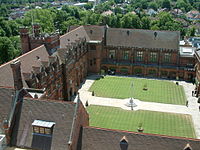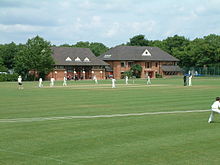- Bancroft's School
-
This article is about the school in England. For the school in the United States, see Bancroft School.
Bancroft's School Motto Unto God Only Be Honour and Glory Established 1737 Type Independent Religion Church of England Head Mrs M.E. Ireland Chaplain Rev. I Moore Chairman of Governors Stephen Foakes, TD, DL, FCIB Founder Francis Bancroft Location High Road
Woodford Green
Essex
IG8 0RF
EnglandLocal authority Redbridge Staff c.90 Gender Coeducational Ages 7–18 Houses North, East, West and School Colours Red, Green, Yellow and Blue Website Bancroft's School Web-site Coordinates: 51°36′17″N 0°01′39″E / 51.60482°N 0.02742°E
Bancroft's School is a co-educational independent school in Woodford Green, London. The school has around 1,000 pupils aged between 7 and 18. The Preparatory School has 200 pupils and the Senior School has 800.
Contents
History
The school was founded in 1737, following the death of Francis Bancroft,[1] who gave a sizeable sum of money to the Drapers' Company, which continues to act as trustee for the school. Bancroft's began in the Mile End Road in London's East End as a small charitable day school for boys, with an attached almshouse for 24 elderly gentlemen, and over the next 250 years it evolved steadily to its present form.
The foundation was originally known as Bancroft's Hospital and until the late 19th century also acted as home for the almsmen. The school then moved to a new site at Woodford Green and the original buildings were demolished; the site is now occupied by Queen Mary College, one of the colleges of the University of London.
The new school in Woodford Green occupies four and a half acres, and the main buildings were designed by Arthur Blomfield, who was also responsible for Selwyn College in Cambridge. Originally there were just a hundred pupils, including sixty boarders, but the numbers grew steadily during the twentieth century until there were nearly one thousand on the roll. The buildings were also extended, with the Science Block (1910), a new Assembly Hall (1937), the Adams Building (1964), a new Gymnasium Block (1975), the Prep School (1990), the Courtyard Building (2006), new Sports Block (2007), and Prep School Extension (2009).
Following the Education Act 1944, Bancroft's became a direct grant grammar school. However, the removal of this status in the 1970s prompted the Governors to decide on three courses of action. These were to discontinue boarding, to admit girls for the first time and to build a new Preparatory Department. These were all completed by 1990; the School now takes half its pupils from age 7, and half the pupils are now girls. In 1997, the Government abolished the Assisted Places Scheme, which had helped children from poor families to attend the school; the Governors replaced these by Francis Bancroft Scholarships, which were supported by the Drapers' Company and by the residue of Francis Bancroft's original will. These awards are means-tested, and can be worth the entire school fee.
In 2004, a new major building programme began. The Courtyard Building, consisting of new kitchens, a communal atrium, staff offices, further teaching rooms and a new Sixth Form Centre, was opened by Chris Woodhead in February 2006, and a new large Sports Hall was completed at the beginning of the Summer Term 2007. In 2009, a conversion of the old gymnasium into a modern Drama Centre was finished with students enjoying the new facilities available. A large new building for the prep school and a second floor in the historic library for additional computer usage was completed in 2010. Most recently in 2011, an extension to the recently built 6th form block compromising of a number of new facilities including a separate 6th form library was completed. The school also continues to invest heavily in it's IT infrastructure with the roll out of new hardware and software systems recently being completed.
Mrs Mary Ireland became headmistress in January 2008, succeeding Dr Peter Scott. She last worked at Christ's Hospital where she was deputy head to Dr Peter Southern, himself a previous headmaster at Bancroft's.
The school team won the Kids' Lit Quiz in 2009 at the world final in South Africa.[2]
Year groups
The preparatory school has four years which are known as:
- Alpha (Year 3); Beta (Year 4); Prep One (Year 5); Prep Two (Year 6)
The senior school has its own naming system, in ascending age order:
- Thirds (Year 7); Removes (Year 8); Lower Fourth (Year 9); Upper Fourth (Year 10); Fifth Form (Year 11); Lower Sixth (Year 12); Upper Sixth (Year 13)
Curriculum
For the first two years, students study the following subjects: English, Maths, French, ICT, Combined Science, Drama, Classics (in Thirds, Year 7), Religious Studies, Geography, Latin (from Removes, Year 8) and upwards, PSHE, History, PE, Games, Music, Technology and Art.
In the Lower Fourth year, students choose a second language (Spanish, German or Ancient Greek) and to drop two creative subjects (from Art, Music, Design Technology & Electronics, and Drama).
At GCSE level, all pupils take the following common core subjects: English, English Literature, Mathematics, Physics, Chemistry and Biology. Four additional subjects are chosen, one of which must be a modern language: Art, DT, Electronics, Music, Spanish, German, French, Latin, Ancient Greek, Greek Civilization, Religious Studies, Geography and History.
The school has opted to follow the IGCSE syllabus in Mathematics. About 2 fifths of the pupils take this a year early, and go on to take Additional Maths in the Fifth Form. A similar proportion take French a year early, and then go on to study a third of the AS Level course and now Critical Thinking as well, with the option to take the AS exam in Critical Thinking at the end of the year.
A-Level students pick four of the subjects from the list that the school offers: Art, Biology, Business Studies, Chemistry, Classical Civilisation, Critical Thinking, Design Technology, Drama, Economics, Electronics, English Literature, French, Geography, German, Greek, History, Latin, Mathematics, Further Mathematics, Music, Physical Education, Physics, Religious Studies and Spanish. There are also courses to AS level in Government and Politics, and Music Technology. Play Directing, German (beginners), Spanish (beginners), Circuit Training, Creative Writing, Music Theory, Financial Studies, Medicine, ICT (ECDL) and Critical Analysis are also offered to students choosing to continue with only three of their A-Level choices in the Upper Sixth.
Grading system
The pre-GCSE students (Thirds, Removes and Lower-Fourths [up to the last half-term of Lower-Fourth]) are still given grades with A to D measuring effort (With A representing the highest level of effort given) and 6 to 1 measuring achievement (With 6 representing the highest level of achievement). Now the grading system for GCSE students has changed. The numbers of achievement scale from 1 to 9, 9 being a high A*, 8 being an A*, 7 being a A/A*, 6 being an A, and so on. Three letter grades are given - one for Attitude, one for Classwork and one for Homework. In the sixth form, the grading system changes. Effort is still measured by letters from A to D but achievement is measured on a scale of 1 to 9 against a baseline grade (This is calculated based on GCSE grades and Centigrade tests conducted in earlier years) The numeric grade is an indication of a pupil's expected AS or A level results.
School song (Latin and translation)
Floreat Bancroftia,
Floreamus pueri,
Vivat et memoria,
Fundatoris nostri.
Nobis en aeternum,
Magni sint honores,
Floreat Bancroftia,
Floreant rectores.Previous headmasters
Name Joined Left Peter Southern 1985 1996 Peter Scott - left 1996 2008 Mary Northern Ireland 2008 - Notable alumni
Name Birth Death Achievements Connop Thirlwall 1797 1875 Bishop of Saint David's, 1840–1874, and historian Sir Allan Powell 1876 1948 Chairman of Governors of the BBC, 1939–1946 Henry Mess 1884 1944 Social worker and sociologist Sir Reader Bullard 1885 1976 Ambassador to Iran, 1943–1945 Robert "Eddie" Cruickshank 1888 1961 World War I Victoria Cross Sir Leslie Peppiatt 1891 1968 Solicitor Gilbert Waterhouse 1893 1916 Trench poet Sir Kenneth Peppiatt 1893 1983 20th Chief Cashier, Bank of England, 1934-1949 Anthony Jacques Mantle, DFC 1899 1988 World War I Distinguished Flying Cross Sir Wilfrid Sheldon 1901 1983 Paediatrician Lieutenant-Colonel Augustus Charles Newman 1904 1972 World War II Victoria Cross Flt Lieutenant Leslie Brodrick World War II List of Allied airmen from the Great Escape Sir Frederick Warner 1910 2010 Chemical engineer Denis Quilley 1927 2003 Actor John Bromley 1934 2002 Sports broadcasting executive Sir Neil Macfarlane 1936 Member of Parliament for Sutton and Cheam1974–1992 Graham Edward Alfred Kentfield 1940 The 28th Chief Cashier - Bank of England (1991–1998) Martyn Turner 1948 Political cartoonist David Pannick 1956 Barrister Michael Richard Lynch 1965 The first British-based internet billionaire entrepreneur Alan Davies 1966 Comedian and actor Martin Fitzpatrick 1967 Head of Music ENO Hari Kunzru 1969 Novelist Samantha Smith 1971 Former British No. 1 ladies tennis player Peter Erskine Chief Executive Officer, O2 plc Joe Lovejoy Chief Football Writer, The Sunday Times Adam Foulds 1974 Novelist and poet Russell Lissack 1981 Lead Guitarist, Bloc Party Andy Saull 1988 Professional Rugby Player, Saracens FC Samantha Spiro 1968 Actress Norman Suckling 1904 Biographer, composer, pianist, writer on music, and educator Ed Gleave 1985 Showbiz reporter, Daily Star Sunday newspaper Bobby Friedman 1985 Author, John Bercow biography made bestseller list The Old Bancroftian Association
The Old Bancroftian Association (OBA) started in 1892 when the Old Bancroftians' Football Club was formed, although there were already a few unofficial groups which had been around since the 1860s. The first meeting was held in 1896 at the Haunch of Venison in Fleet Street. However, a constitution was not agreed until 1909, when the first President, H.C Playne[3] (who was also the school's Head Master), was appointed. The idea of the association was to keep young and old members together.
The association grew rapidly over the years and in 2005 membership for life was introduced for all Bancroftians, by which time there were 3,175 members.[4]
The association provides many services for former members of the school including reunions and various sports teams, including cricket, rugby and golf.
References
External links
- Official website
- The Virtual Learning Environment
- Profile at the Good Schools Guide
- Old Bancroftians website
Categories:- Independent schools in London
- Member schools of the Headmasters' and Headmistresses' Conference
- Old Bancroftians
- Kids' Lit Quiz winners
Wikimedia Foundation. 2010.


